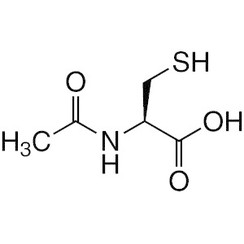You have no items in your shopping cart
N-Acetyl-L-cysteine
Acetylcysteine, also known as N-acetylcysteine (NAC), is a medication that is used to treat paracetamol (acetaminophen) overdose, and to loosen thick mucus in individuals with cystic fibrosis or chronic obstructive pulmonary disease. It can be taken intravenously, by mouth, or inhaled as a mist. Some people use it as a dietary supplement.
Common side effects include nausea and vomiting when taken by mouth. The skin may occasionally become red and itchy with either form. A non-immune type of anaphylaxis may also occur. It appears to be safe in pregnancy. For paracetamol overdose, it works by increasing the level of glutathione, an antioxidant that can neutralise the toxic breakdown products of paracetamol. When inhaled, it acts as a mucolytic by decreasing the thickness of mucus.
Acetylcysteine was initially patented in 1960 and came into medical use in 1968. It is on the World Health Organization's List of Essential Medicines. It is available as a generic medication and is inexpensive.

